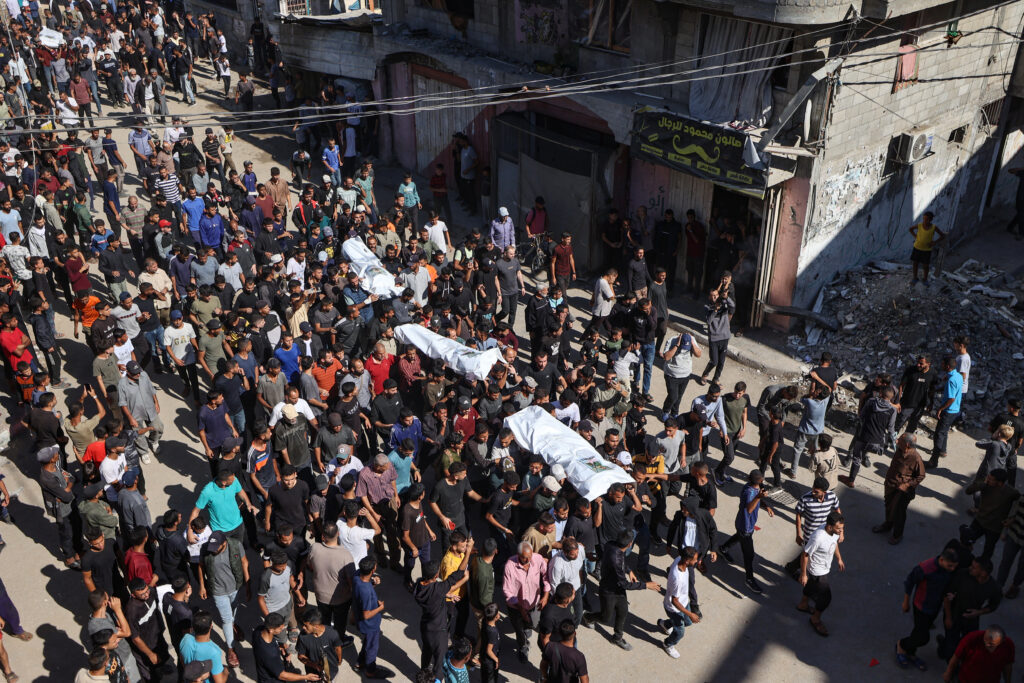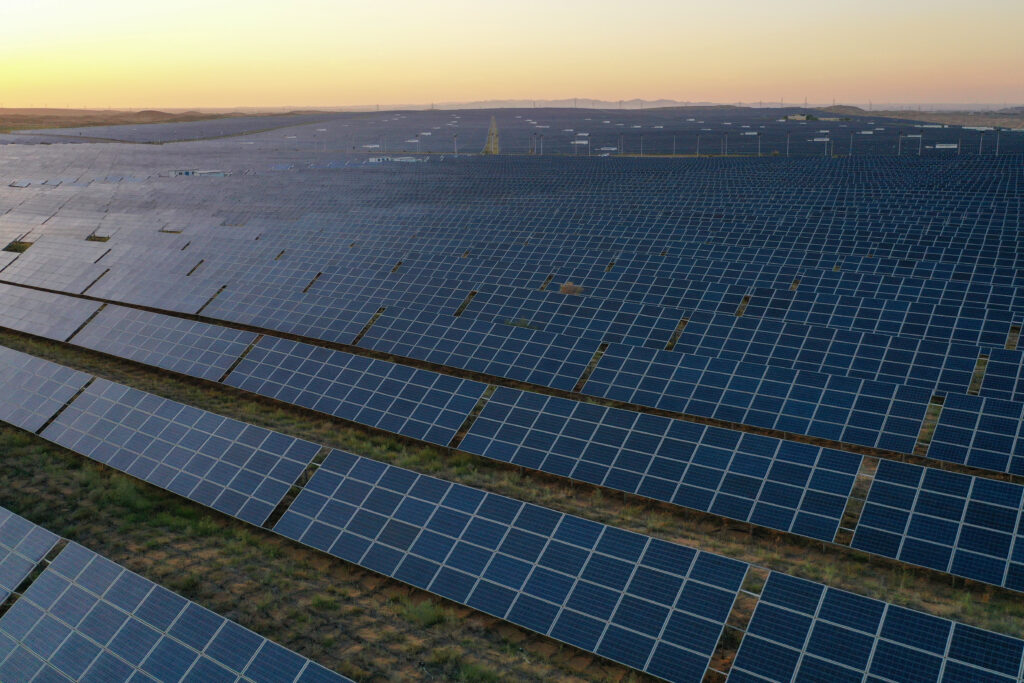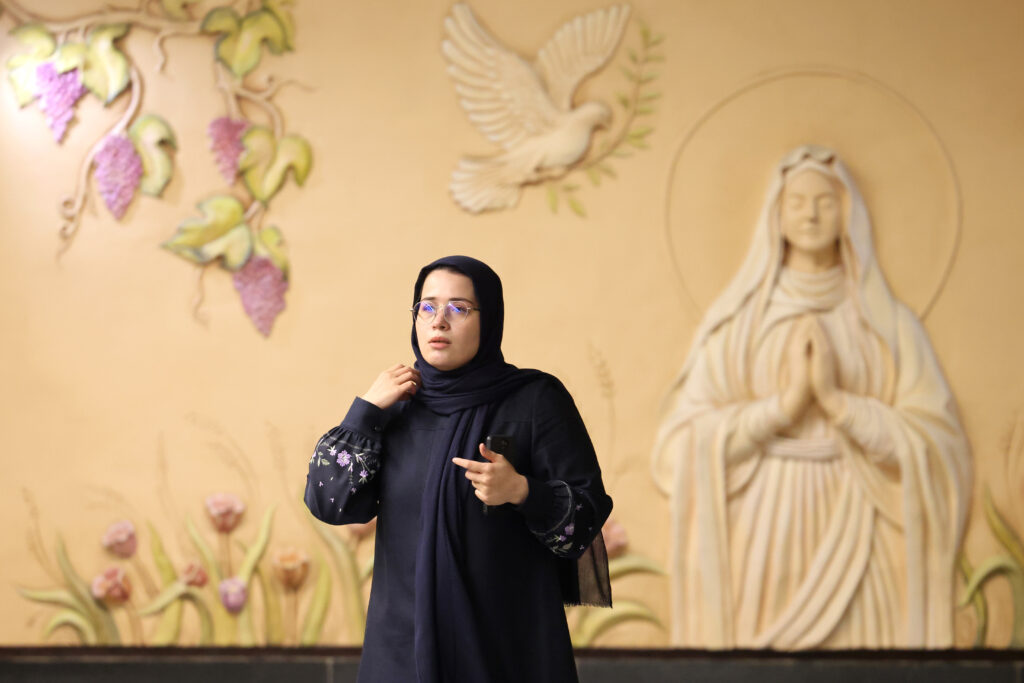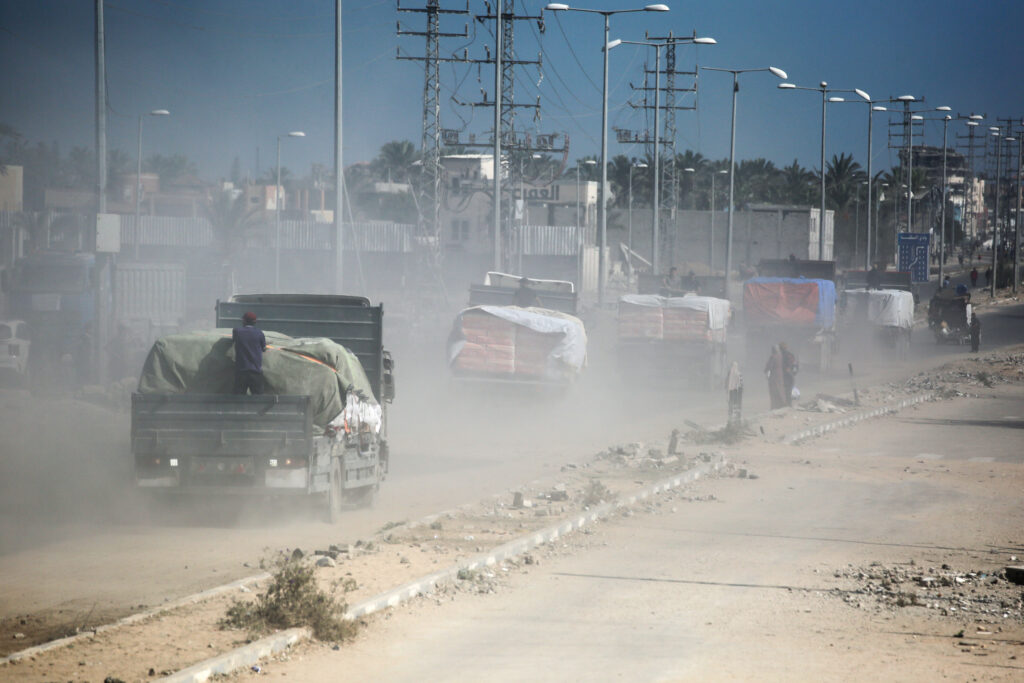AFP Asia Business
Israel receives bodies of two more hostages returned by Hamas
The Israeli government said on Sunday that Hamas has handed over more hostage remains, as delays in finding bodies buried under the rubble of Gaza threatened the fragile ceasefire.The issue of hostage bodies still in Gaza has become a sticking point in the ceasefire implementation, with Israel linking the reopening of the main gateway into the territory to the recovery of all of the deceased.Relief agencies have called for the Rafah border crossing from Egypt to be reopened to speed the flow of food, fuel and medicines.Gaza rescuers, meanwhile reported fresh violence in some areas despite the truce.Hamas’s armed wing, the Ezzedine Al-Qassam Brigades, handed over the remains of two hostages on Saturday night as part of the US-brokered ceasefire agreement.Prime Minister Benjamin Netanyahu’s office confirmed the Red Cross had received the remains and handed them to Israeli forces for identification.Netanyahu warned the war in Gaza will not be over until Hamas disarms and the Palestinian territory is demilitarised.”When that is successfully completed — hopefully in an easy way, but if not, in a hard way — then the war will end,” he said in an appearance on right-wing Israeli Channel 14.Netanyahu, Israel’s longest-serving premier, also told the channel he would contest elections next year and expected to win. Hamas has so far resisted disarming and, since the pause in fighting, has moved to reassert its control over Gaza.The US State Department on Saturday said it had “credible reports” that Hamas was planning an imminent attack against civilians in Gaza, warning that it would be a “ceasefire violation”.”Should Hamas proceed with this attack, measures will be taken to protect the people of Gaza and preserve the integrity of the ceasefire,” it said in a statement, without elaborating on the nature or target.- Rafah crossing closed -Under the US-brokered ceasefire, Hamas has so far released all 20 living hostages along with the remains of 12 dead, including the latest two yet to be identified.In exchange, Israel has released nearly 2,000 Palestinian prisoners and 135 bodies of Palestinians since the truce came into effect on October 10.Hamas has said it needs time and technical assistance to recover the remaining bodies from under Gaza’s rubble.Netanyahu’s office said he had “directed that the Rafah crossing remain closed until further notice”.”Its reopening will be considered based on how Hamas fulfils its part in returning the hostages and the bodies of the deceased, and in implementing the agreed-upon framework,” it said.Hamas warned late Saturday that the closure of the Rafah crossing would cause “significant delays in the retrieval and transfer of remains”.- Gaza killings persist -Some violence has persisted despite the ceasefire. Gaza’s civil defence agency, which operates under Hamas authority, said on Saturday that it had recovered the bodies of nine Palestinians — two men, three women and four children — from the Shaaban family after Israeli troops fired two tank shells at a bus.Two more victims were blown apart in the blast and their remains have yet to be recovered, it said.At Gaza City’s Al-Ahli Hospital, the victims were laid out in white shrouds as their relatives mourned.”My daughter, her children and her husband; my son, his children and his wife were killed. What did they do wrong?” said grandmother Umm Mohammed Shaaban.The Israeli military said it had fired on a vehicle that approached the so-called “yellow line”, to which its forces withdrew under the terms of the ceasefire, and gave no estimate of casualties.- Digging latrines -Tom Fletcher, the UN head of humanitarian relief, was in northern Gaza on Saturday, where limited aid has trickled through since the Rafah crossing closed.”To see the devastation — this is a vast part of the city, just a wasteland — and it’s absolutely devastating to see,” he told AFP.Fletcher said the task facing the UN and aid agencies was a “massive, massive job”.He said he had met residents returning to destroyed homes who were trying to dig latrines in the ruins.”We have a massive 60-day plan now to surge in food, get a million meals out there a day, start to rebuild the health sector, bring in tents for the winter, get hundreds of thousands of kids back into school.”burs-rlp/dhw/lb
China’s power paradox: record renewables, continued coal
Call it the China power paradox: while Beijing leads the world in renewable energy expansion, its coal projects are booming too.As the top emitter of greenhouse gases, China will largely determine whether the world avoids the worst effects of climate change.On the one hand, the picture looks positive. Gleaming solar farms now sprawl across Chinese …
China’s power paradox: record renewables, continued coal Read More »
Netanyahu says Gaza war not over until Hamas disarms
Israeli Prime Minister Benjamin Netanyahu warned on Saturday that the war in Gaza would not be over until Hamas was disarmed and the Palestinian territory demilitarised.His declaration came as Hamas’s armed wing, the Ezzedine Al-Qassam Brigades, handed over the remains of two further hostages on Saturday night under a US-brokered ceasefire agreement.Netanyahu’s office said late Saturday that a Red Cross team had received the remains of two hostages from Hamas and handed them to Israeli forces in Gaza, from where they would be taken to Israel to be identified.The issue of the dead hostages still in Gaza has become a sticking point in the implementation of the first phase of the ceasefire. Israel has linked the reopening of the key Rafah crossing to the territory to the recovery of the hostages’ remains.Netanyahu cautioned that completing the ceasefire’s second phase was essential to ending the war and involved the disarming of Hamas and the demilitarisation of the Gaza Strip.”When that is successfully completed — hopefully in an easy way, but if not, in a hard way — then the war will end,” he added in an appearance on right-wing Israeli Channel 14.Hamas has so far resisted the idea and since the pause in fighting has moved to reassert its control over Gaza.The US State Department on Saturday said it had “credible reports” that Hamas was planning an imminent attack against civilians in Gaza, warning that would be a “ceasefire violation”.”Should Hamas proceed with this attack, measures will be taken to protect the people of Gaza and preserve the integrity of the ceasefire,” it said in a statement, without elaborating on the nature or target of such an attack.- Rafah crossing closed -Under the ceasefire deal brokered by US President Donald Trump, Hamas has so far released all 20 living hostages, along with the remains of nine Israelis and one Nepalese.In exchange, Israel has released nearly 2,000 Palestinian prisoners and 135 other bodies of Palestinians since the truce came into effect on October 10.Hamas has said it needs time and technical assistance to recover the remaining bodies, which it says are buried under Gaza’s rubble.Netanyahu’s office said he had “directed that the Rafah crossing remain closed until further notice”.”Its reopening will be considered based on how Hamas fulfils its part in returning the hostages and the bodies of the deceased, and in implementing the agreed-upon framework,” it said, referring to the week-old ceasefire deal.Hamas warned late Saturday that the closure of the Rafah crossing would cause “significant delays in the retrieval and transfer of remains”.- Digging latrines -Further delays to the reopening could also complicate the task facing Tom Fletcher, the UN head of humanitarian relief, who was in northern Gaza on Saturday.”To see the devastation — this is a vast part of the city, just a wasteland — and it’s absolutely devastating to see,” he told AFP.Fletcher said the task ahead for the UN and aid agencies was a “massive, massive job”.He said he had met residents returning to destroyed homes who were trying to dig latrines in the ruins.”We have a massive 60-day plan now to surge in food, get a million meals out there a day, start to rebuild the health sector, bring in tents for the winter, get hundreds of thousands of kids back into school.”- Gaza killings continue -Some violence has persisted despite the ceasefire. Gaza’s civil defence agency, which operates under Hamas authority, said on Saturday that it had recovered the bodies of nine Palestinians — two men, three women and four children — from the Shaaban family after Israeli troops fired two tank shells at a bus.Two more victims were blown apart in the blast and their remains have yet to be recovered, it said.At Gaza City’s Al-Ahli Hospital, the victims were laid out in white shrouds as their relatives mourned.”My daughter, her children and her husband; my son, his children and his wife were killed. What did they do wrong?” demanded grandmother Umm Mohammed Shaaban.The Israeli military said it had fired on a vehicle that approached the so-called “yellow line”, to which its forces withdrew under the terms of the ceasefire, and gave no estimate of casualties.burs-rlp/aha
Iran’s new metro station honours Virgin Mary
Shiite Islam may be the official religion in Iran, but entering Tehran’s brand-new Maryam Moghaddas metro station, you could be forgiven for feeling as if you’re stepping inside a Christian church.Maryam Moghaddas in Persian translates as “Holy Mary”. And the station’s vaulted and arched concourse, with a dome decorated with Persian motifs, features religious frescoes and artworks honouring Christianity’s Virgin Mary, the mother of Christ.Mary is also a venerated figure in Islam. And she is depicted here in prayer with her eyes closed, a white dove hovering just above her head. Another artwork, along the platform, depicts her son Jesus Christ, who appears to be watching over passengers as they wait for their train.The Virgin Mary enjoys universal respect in Iran, and she is a figure seen to be able to foster ties between believers of whatever religion.Maryam is also one of the most common female names in the country.”Every single element you see at this station was designed so that when someone passes through here, they understand that our goal was to respect other religions, Christianity in particular,” Tina Tarigh Mehr, the artist behind the works, told AFP.”This bird (the white dove) is a symbol of the Holy Spirit. The olive tree is a symbol of peace and friendship,” she said during a tour organised for the press on Saturday, ahead of the station’s upcoming public opening.- Woman and ‘purity’ -In Iran, a vast multicultural country, Shiite Islam is the official state religion. However, the Constitution recognises Sunni Islam, Zoroastrianism, Judaism and Christianity as minority religions, each of which has its own representatives in the Iranian parliament.Christianity was present in this part of the world long before the rise of Islam during the Arab conquest of Persia in the 7th century AD.”This station recalls the divine woman who awakened the world through her purity and by nurturing a great prophet,” said Tehran Mayor Alireza Zakani on X.He added that the building was designed to “showcase the coexistence of divine religions in Tehran.”The official number of Christians living in Iran is unknown, but various sources estimate it at between 130,000 and one million.In Tehran, a metropolis of over 10 million people, the Saint Sarkis Cathedral of the Armenian Apostolic Church is one of its most visible symbols.It is located near the new station, the construction of which began 10 years ago.The first metro line in Iran opened in Tehran in 1999 and currently the Iranian capital has approximately 160 operational stations.Several are renowned for their artistic finesse, a clever blend of modern architecture and traditional Persian elements.
Hamas says to hand over bodies of two more hostages
Hamas said it will hand over the bodies of two hostages later on Saturday, after Israel warned that the main crossing from Egypt into Gaza would remain shut until the Palestinian group returns the remains of all deceased captives.The UN relief chief meanwhile called for massive humanitarian support for the devastated Gaza Strip during a tour of the area.Hamas’s armed wing, the Ezzedine Al-Qassam Brigades, said on its Telegram channel that the group would “handover at 10:00 PM (1900 GMT) today the bodies of two Israeli captives, whose remains were recovered earlier today in the Gaza Strip”.Under a ceasefire deal brokered by US President Donald Trump, Hamas has so far released all 20 living hostages, along with the remains of nine Israelis and one Nepalese.The most recent handover was on Friday night, that of the body identified by Israel as Eliyahu Margalit, who died aged 75 in Hamas’s October 7, 2023 attack.In exchange, Israel has released nearly 2,000 Palestinian prisoners and 135 other bodies of Palestinians since the truce came into effect on October 10.The Palestinian mission in Cairo announced that the Rafah crossing between Gaza and Egypt could open as early as Monday, though only for Gazans living in Egypt who wished to return to the territory. Shortly after, however, Prime Minister Benjamin Netanyahu’s office said he had “directed that the Rafah crossing remain closed until further notice”. “Its reopening will be considered based on how Hamas fulfils its part in returning the hostages and the bodies of the deceased, and in implementing the agreed-upon framework,” it said, referring to the week-old ceasefire deal.Further delays to the reopening of Rafah could complicate the task facing Tom Fletcher, the UN head of humanitarian relief, who was in Gaza on Saturday. The British diplomat and his team travelled in a convoy of SUVs to see a wastewater treatment plant in Sheikh Radwan, north of Gaza City. “I drove through here seven to eight months ago when most of these buildings were still standing and, to see the devastation — this is a vast part of the city, just a wasteland — and it’s absolutely devastating to see,” he told AFP.- Digging latrines -Surveying the damaged pumping equipment and a lake of sewage at the Sheikh Radwan wastewater plant, Fletcher said the task ahead for the UN and aid agencies was a “massive, massive job”.He said he had met residents returning to destroyed homes who were trying to dig latrines in the ruins.”They’re telling me most of all they want dignity,” he said. “We’ve got to get the power back on so we can start to get the sanitation system back in place.”We have a massive 60-day plan now to surge in food, get a million meals out there a day, start to rebuild the health sector, bring in tents for the winter, get hundreds of thousands of kids back into school.”The Rafah crossing has yet to reopen but, just over a week since the brokering of the truce, hundreds of trucks are rolling in each day via Israeli checkpoints and aid is being distributed.According to figures supplied to mediators by the Israeli military’s civil affairs agency and released by the UN humanitarian office, on Thursday some 950 trucks carrying aid and commercial supplies crossed into Gaza from Israel.Relief agencies have called for the Rafah border crossing to be reopened to speed the flow of food, fuel and medicines, and Turkey has a team of rescue specialists waiting at the border to help find hostage bodies in the rubble.- ‘What did they do wrong? -Some violent has persisted despite the ceasefire. Gaza’s civil defence agency, which operates under Hamas authority, said on Saturday that it had recovered the bodies of nine Palestinians — two men, three women and four children — from the Shaaban family after Israeli troops fired two tank shells at a bus.Two more victims were blown apart in the blast and their remains have yet to be recovered, it said. At Gaza City’s Al-Ahli Hospital, the victims were laid out in white shrouds as their relatives mourned. “My daughter, her children and her husband; my son, his children and his wife were killed. What did they do wrong?” demanded grandmother Umm Mohammed Shaaban. “They were little… What did they do wrong? There is no truce.”The military said it had fired on a vehicle that approached the so-called “yellow line”, to which its forces withdrew under the terms of the ceasefire, and gave no estimate of casualties “The troops fired warning shots toward the suspicious vehicle, but the vehicle continued to approach the troops in a way that caused an imminent threat to them,” the military said.”The troops opened fire to remove the threat, in accordance with the agreement.”burs-dc-jd/spm/dcp
Israel says Gaza gateway stays shut until hostage bodies returned
Israel warned on Saturday the main gateway into Gaza from Egypt would remain shut while Hamas recovered the bodies of former hostages, just as the UN relief chief said the devastated territory needed massive humanitarian support.The Palestinian mission in Cairo had announced that the Rafah crossing could open as early as Monday, though only for Gazans living in Egypt who wished to return to the territory. Shortly after, however, Netanyahu’s office said he had “directed that the Rafah crossing remain closed until further notice”. “Its reopening will be considered based on how Hamas fulfils its part in returning the hostages and the bodies of the deceased, and in implementing the agreed-upon framework,” it said, referring to the week-old ceasefire deal.Further delays to the reopening of Rafah could complicate the task facing Tom Fletcher, the UN head of humanitarian relief, who was in Gaza on Saturday. The British diplomat and his team travelled in a convoy of SUVs to see a wastewater treatment plant in Sheikh Radwan, north of Gaza City. “I drove through here seven to eight months ago when most of these buildings were still standing and, to see the devastation — this is a vast part of the city, just a wasteland — and it’s absolutely devastating to see,” he told AFP.The densely populated cities of the Gaza Strip, home to more than two million Palestinians, have largely been reduced to ruins by two years of bombardment and intense fighting between Hamas and the Israeli military.The Rafah crossing has yet to reopen but, just over a week since the brokering of the truce, hundreds of trucks are rolling in each day via Israeli checkpoints and aid is being distributed.- Digging latrines -Surveying the damaged pumping equipment and a lake of sewage at the Sheikh Radwan wastewater plant, Fletcher said the task ahead for the UN and aid agencies was a “massive, massive job”.He said he had met residents returning to destroyed homes who were trying to dig latrines in the ruins.”They’re telling me most of all they want dignity,” he said. “We’ve got to get the power back on so we can start to get the sanitation system back in place.”We have a massive 60-day plan now to surge in food, get a million meals out there a day, start to rebuild the health sector, bring in tents for the winter, get hundreds of thousands of kids back into school.”According to figures supplied to mediators by the Israeli military’s civil affairs agency and released by the UN humanitarian office, on Thursday some 950 trucks carrying aid and commercial supplies crossed into Gaza from Israel.Relief agencies have called for the Rafah border crossing from Egypt to be reopened to speed the flow of food, fuel and medicines, and Turkey has a team of rescue specialists waiting at the border to help find hostage bodies in the rubble.Some violent has persisted despite the ceasefire. Gaza’s civil defence agency, which operates under Hamas authority, said on Saturday that it had recovered the bodies of nine Palestinians — two men, three women and four children — from the Shaaban family after Israeli troops fired two tank shells at a bus.Two more victims were blown apart in the blast and their remains have yet to be recovered, it said. At Gaza City’s Al-Ahli Hospital, the victims were laid out in white shrouds as their relatives mourned. “My daughter, her children and her husband; my son, his children and his wife were killed. What did they do wrong?” demanded grandmother Umm Mohammed Shaaban. “They were little… What did they do wrong? There is no truce.”The military said it had fired on a vehicle that approached the so-called “yellow line”, to which its forces withdrew under the terms of the ceasefire, and gave no estimate of casualties “The troops fired warning shots toward the suspicious vehicle, but the vehicle continued to approach the troops in a way that caused an imminent threat to them,” the military said.”The troops opened fire to remove the threat, in accordance with the agreement.”- Hostage remains -Hamas has returned the final 20 surviving hostages it was holding and has begun to hand over the remains of another 28 who died.On Friday night, it turned over a body identified by Israel as Eliyahu “Churchill” Margalit, a resident of Nir Oz kibbutz who died aged 75 in the October 7, 2023 attack that ignited the war in Gaza.”He was a cowboy at heart, and for many years managed the cattle branch and the horse stables of Nir Oz,” said the Hostages and Missing Families Forum, a support group founded by relatives of the hostages. “On October 7, he went out to feed his beloved horses and was kidnapped from the stable.”Margalit was married with three children and three grandchildren. His daughter Nili Margalit, also taken hostage, was freed during the war’s first brief truce in November 2023.burs-dc/jd/dcp




